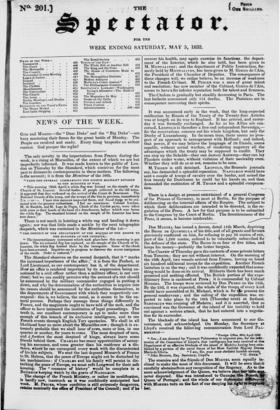The only novelty in the importations from France during the
week, is a rising at Marseilles, of the extent of which we are but imperfectly informed. It was made known to the public of Lon- don on Thursday by the Standard, which contrives for the most part to distance its contemporaries in these matters. The following is the account; it is from the Moniteur of the 30th.
"FROM THE GENERAL COMMANDING THE EIGHTS! MILITARY DIVISION TO THE MINISTER OF WAR.
"This morning 190th April] a white flag was hoisted on the steeple of the Church of St. Laurent. Several bodies of people collected in the old town. it appeared that they reckoned on the arrival of the Count de Bourmont. The National Guards of the town, and the troops'of the line in garrison, immediately ar-.s. I have this moment inspected them, and found theft to he am- mated with the greatest enthusiasm. I feel no uneasiness. Colonel Lachan, M. de Bandole, and M. Lege de Pogie, Chiefs of the Carlist party, were taken with arms in their hands at the head of a detachment, before which was borne the white flag. The standard hoisted on the steeple of St. Laurent has been torn down."
There is not much in hoisting a white rag and hauling it down again; nor was that little made a mickle by the next telegraphic despatch, which was contained in the Moniteur of the 1st- ‘, THE PREFECT OF THE DEPARTMENT OF THE tropprs OF THE RHONE TO THE MINISTER OF THE INTERIOR:.
" The insurrectionary movement which took place hire this morning is put down. The tri-coloured flag has replaced, on the steeple of the Church of St. Laurent, the white flag hoisted there by the insurgents. Some of the chiefs have been arrested. Inquiries are in progress to discover the secret instigators of the revolt. Order is restored."
The Standard observes on the second despatch, that it " marks the increased importance of the affair ;" it is from the Prefect, or Lord Lieutenant, as our contemporary has it, of the department. How an affair is rendered important by its suppression beino-'' an- nonneed by a civil officer rather than a military officer, is not very clear; but we can readily perceive why the account of a riot should be announced by the military commander engaged in putting it down, and why the determination of the authorities to inquire into its: causes should be announced by the authorities themselves, to the departments of Government with which they respectively cor- respond: this is, we believe, the usual, as it seems to be the na- tural process. Perhaps they manage these things differently in France, and the magistrate ought to have told of the mob, and the officer to have intimated the institution of legal proceedings. The truth is, our excellent contemporary is apt to make more than enough of this branch of its exclusive intelligence, and to see French events through English Tory spectacles. We shall in all likelihood bear no more about the Marseilles row; though it is ex- tremely probable that we shall hear of rows, more or less, in one quarter or another, for years to come. The most despised of men, and a :fortiori the most despised of kings, always leave some friends behind them. CHARLES has many opportunities of annoy- ing his successor, and none greater than his residence at a dis- tance, where he can correspond every week with the discontented of his late subjects. We sent the last deposed Monarch of France to St. Helena, that the peace of Europe might not be disturbed by his machinations : if CHARLES and his family will persist in dis- turbing the peace of Europe, we must refit Longwood for their safe keeping. The " romance of history" would be complete in a BOURBON keeping Match by the grave of NAPOLEON. The change of the French Ministry, or rather its modification, is hardly new, inasmuch as it was confidently anticipated last week. M. Penile whose condition is still extremely dangerous, retains nominally the office of President of-the Council; and if he recover his health, may again exercise its functions. the depart- ment of the Interior, which he also held, has been given to M. MONTALIVET and the department of Public Instruction, for- merly held by MONTALIVET, has been given to M. G1ROD de l'Ain, the President of the Chamber of Deputies. The consequence of these changes will, we rather believe, be an increase of weakness to the French Cebinet. M. PERIER was a man of great talent and resolution; tue new member of the Cabinet, GIROD de l'Ain, seems to have a far inferior reputation both for talent and firmness.
The Cholera is gradually but steadily decreasing in Paris. The last bulletin announced only 114 deaths. The Parisians are in consequence recovering their spirits.



























